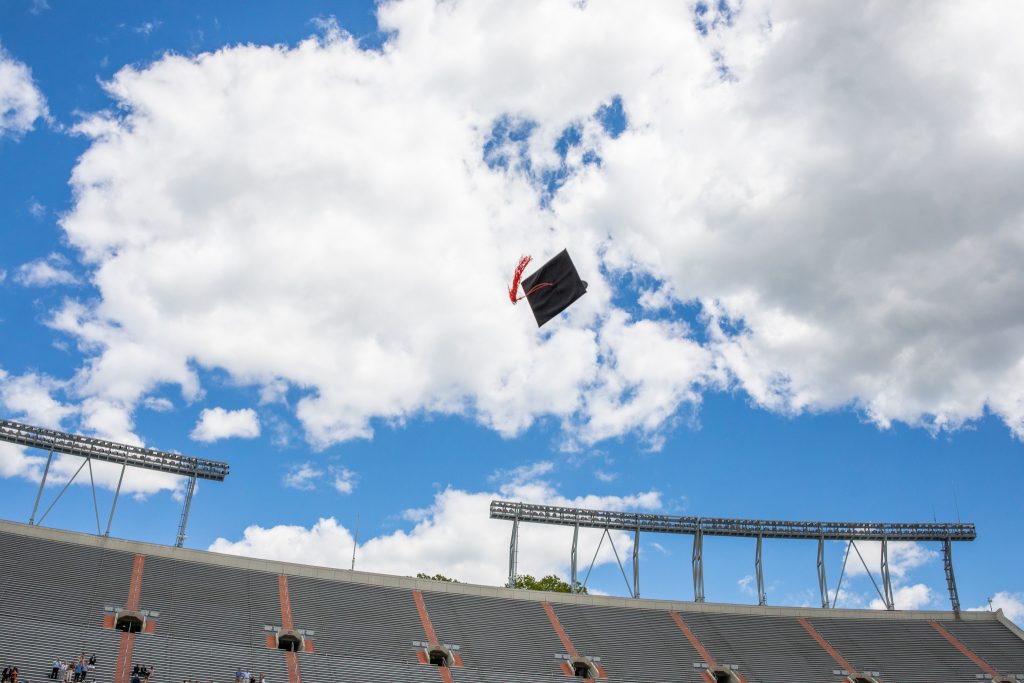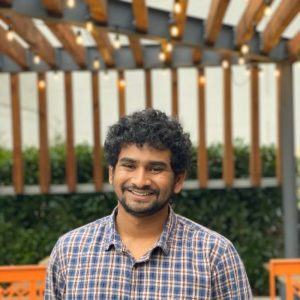Congratulations to Sanghani Center Spring 2022 Graduates

Spring 2022 Commencement ceremonies and related events are under way on Virginia Tech campuses in Blacksburg and in the greater metropolitan D.C. area.
“We celebrate our graduates who have persevered over hurdles raised by the Covid pandemic to reach their academic goals. For longer than anyone would have suspected at the onset of the pandemic, this group of students had to adapt to a virtual environment. Online, they attended classes, met with their advisors, conducted research, presented papers at conferences, and worked at internships,” said Naren Ramakrishnan, the Thomas L. Phillips Professor of Engineering in the Department of Computer Science at Virginia Tech and director of the Sanghani Center for Artificial Intelligence and Data Analytics. “We are proud of all they have accomplished during their years at the center and wish them continued success as they begin their professional careers.”
Following is a list of Sanghani Center graduates:
Ph.D.
Chidubem Arachie, advised by Bert Huang, has earned a Ph.D. in computer science. His research interest lies in developing algorithms for weakly supervised learning. The title of his dissertation is “Learning with Constraint-Based Weak Supervision.” Arachie is joining Google in California as a software engineer.
Yali Bian, advised by Chris North, has earned a Ph.D. in computer science. His research interests include human-computer interaction, visual analytics, machine learning, and machine teaching. The title of his dissertation is “Human-AI Sensemaking with Semantic Interaction and Deep Learning.” Bian is joining the Human and AI Systems Research (HAR) Lab at Intel Labs, Santa Clara, California, as a research scientist.
Subhodip Biswas, advised by Naren Ramakrishnan, has earned a Ph.D. in computer science. His primary research lies in spatial data mining, geographic information systems, education, and crowdsourcing. The title of his dissertation is “Spatial Optimization Techniques for Redistricting.” He has also earned a graduate certificate in urban computing. Biswas is joining the AI verification team at the autonomous vehicle company Zoox in Foster City, California.
Debanjan Datta, advised by Naren Ramakrishnan, has earned a Ph.D. in computer science. Datta’s research focus is on data mining and machine learning, with a special interest in algorithms on anomaly detection and tabular data. The title of his dissertation is “A Framework for Automated Discovery and Analysis of Suspicious Trade Records.” Datta is joining Amazon Web Services (AWS) as an applied scientist.
Chen Gao, advised by Jia-Bin Huang, has earned a Ph.D. in electrical and computer engineering. His research interest lies in the field of computational photography and computer vision. He is focusing on view synthesis and video manipulation. The title of his dissertation is “Learning Consistent Visual Synthesis.” Chen will be joining Meta in Seattle, Washington, as a research scientist.
Taoran Ji, advised by Chang-Tien Lu, has earned a Ph.D. in computer science. His research interests include natural language processing, text mining, and machine learning. The title of his dissertation is “On Modeling Dependency Dynamics of Sequential Data: Methods and Applications.” Ji has joined Moody’s Analytics in New York, as director, artificial Intelligence and machine learning.
Xiaolong Li, advised by Lynn Abbott, has earned a Ph.D. in electrical and computer engineering. His primary research interest is in the area of computer vision, with a special focus on deep 3D representations learning toward dynamic scene understanding. The title of his dissertation is “3D Deep Learning for Object-Centric Geometric Perception.” Li is joining AWS AI in Seattle, Washington, as an applied scientist.
Yuliang Zou, advised by Jia-Bin Huang, has earned a Ph.D. in electrical and computer engineering. His research interest lies in designing label-efficient and/or robust visual understanding methods. The title of his dissertation is “Label-Efficient Visual Understanding with Consistency Constraints.” Zou is joining Waymo, an autonomous driving technology company in Mountain View, California, as a research scientist.
Master’s Degree
Larissa Basso, advised by Chang-Tien Lu, has earned a master’s degree in computer science. Her primary research focus is satellite image retrieval. The title of her thesis is “CLIP-RS: A Cross-modal Remote Sensing Image Retrieval Based on CLIP, Northern Virginia Case Study.”
Chih-Fang Chen, advised by Chang-Tien Lu, has earned a master’s degree in computer science. His primary research interest is urban computing. The title of his thesis is “Metrohelper: A Real-time Web-based System for Metro Incidents Detection Using Social Media.” Chen is joining Amazon as a software developer engineer.
Kai-Hsiang Cheng, advised by Chang-Tien Lu, has earned a master’s degree in computer science. His primary research interests are applied machine learning and data mining. The title of his thesis is “Leverage Fusion of Sentiment Features and Bert-based Approach to Improve Hate Speech Detection.” Cheng is joining Gettr in New York City as software developer.
Riya Dani, advised by Ismini Lourentzou, has earned a master’s degree in computer science. Her primary research involves generating videos of unseen concepts using machine learning. The title of her thesis is “Concept Vectors for Zero-Shot Video Generation.” Dani is joining Amazon Web Services (AWS) in Northern Virginia as an associate solutions architect.
Xuan Li, advised by Lynn Abbott, has earned a master’s degree in electrical and computer engineering. His research focuses on continual learning that prevents a deep neural model from catastrophic forgetting in sequential tasks. The title of his thesis is “Referencing Unlabelled World Data to Prevent Catastrophic Forgetting in Class-incremental Learning.” Li is joining Amazon as software development engineer.
Gopikrishna Rathinavel, advised by Naren Ramakrishnan, has earned a master’s degree in computer science. His research focus is on using deep learning techniques for wireless anomaly detection. The title of his thesis is “Detecting Irregular Network Activity with Adversarial Learning and Expert Feedback.”
Stephen Sun, advised by Chang-Tien Lu, has earned a master’s degree in computer science. His primary research interest is social media analytics. The title of his thesis is “Estimate Flood Damage Using Satellite Images and Twitter Data.” Sun is joining TikTok Inc. in Mountain View, California, as a software engineer.
Han Xu, advised by Lynn Abbott, has earned a master’s degree in electrical and computer engineering. His research focuses on skin segmentation without color information. The title of his thesis is “Color Invariant Skin Segmentation.”
